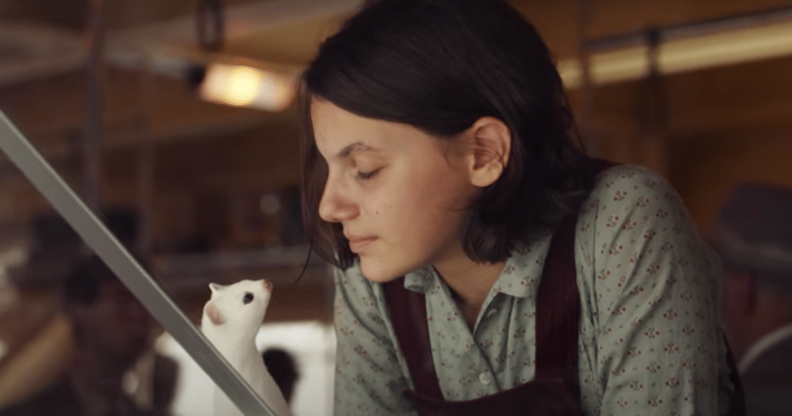Fans think queer characters in Philip Pullman’s His Dark Materials have same-gender dæmons

Lyra in His Dark Materials with her daemon: a pine marten called Pantalaimon (YouTube/HBO)
The BBC and HBO’s His Dark Materials has plunged viewers back into the decadent and terrifying worlds of Phillip Pullman’s imagination – reigniting an old theory about his fantastical creations.
In Pullman’s trilogy (and it’s “equel”, the Book of Dust), characters have dæmons, manifestations of their inner selves that take the form of animals.
Usually, these are of the opposite gender, however some are of the same, prompting theories that these characters are members of the LGBT+ community.
Philip Pullman has previously hinted such theories might be right. In 2000, he said: “Occasionally, no doubt, people do have a dæmon of the same sex. That might indicate homosexuality, or it might indicate some other sort of gift or quality, such as second sight.
“I do not know. But I don’t have to know everything about what I write.”
Most of the characters in the trilogy have dæmons with a different gender to them. However there are mentions of a few people with same-gender dæmons.
Some have theorised that this could be an indication they are gay and/or trans, and that non-binary characters have dæmons with fluid presentations.
“It’s like an aspect of your personality that’s contrasting or more hidden, maybe,” one fan wrote on Reddit. “It would also be dope to imagine people with hermaphroditic frog daemons that change gender rapidly.”
Philip Pullman said same-gender dæmons “might indicate homosexuality”.
His Dark Materials was originally published between 1995 and 2000. However the series has regained popularity since a TV adaptation was released on BBC and HBO. The series stars Dafne Keen, Lin-Manuel Miranda and James McAvoy.
The books and series follow Lyra, an orphan living in a fictional college in Oxford in another reality to ours, as she travels through gateways to different universes to uncover the truth about the mysterious Dust, all while evading the menacing Magisterium (a thinly-veiled Catholic Church).
Previously, Pullman was criticised for the role that religion played in the books. However he said in an interview: “When religion gets the power to tell people how to dress, who to fall in love with, how to behave, what they must not read, what they must not wear, all those things, then religion goes bad.”
The author has previously come out in support of trans children after he got into “terrible trouble… because I said, in all innocence: ‘Look what is this quarrel between feminists and trans people? What’s the argument about?’”
However, he was hesitant to back puberty blockers for young trans people, telling the Guardian: “If I had a child, boy or girl, who felt passionately from an early age, manifestly that they were in the wrong body, I hope I would be understanding and as kind as possible.
“What I don’t think I’d do is hasten them away to an endocrinologist. I know that if you want to transition, it is physically more plausible, or persuasive, if you do it before puberty, but is a child before puberty capable of… I mean the answer is, we don’t know, do we? We don’t know. The only thing we can do is to be as kind as possible.”

